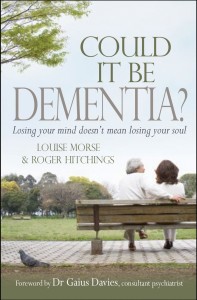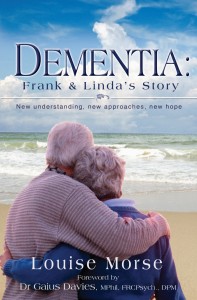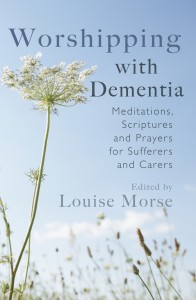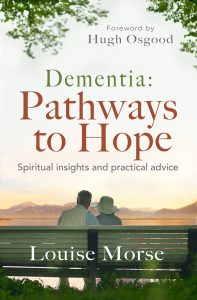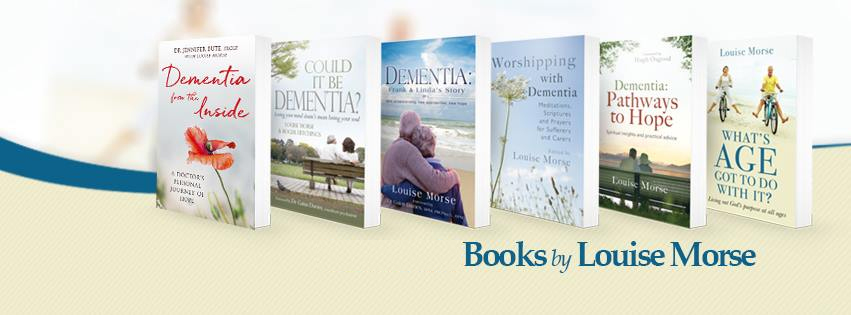
About the Books
Pausing briefly at our stand at a national Christian event, a vicar with a special interest in supporting families with dementia tapped each of our books on display and said, ‘I give my team copies of this and this and this … we use other materials, but these books are by far the best.’
After a seminar at conference a couple came up to speak and, nodding to his wife, the husband said, ’when we knew your last book was going to be released we asked our local bookshop to let us know the minute their order arrived. I collected it, and she stayed up till the early morning reading it.’ His wife added simply, ‘your books helped me through my mother’s dementia. I’ve read all of them – they made such a difference in my life.’
Again, at a national Christian event a mother passing by with a child in a push-chair said over her shoulder, ‘my mother bought your book, Dementia, Frank and Linda’s Story, and after she’d read it went out and bought 20 copies to give to people. The first one was to our vicar.’
‘Could it Be Dementia? Loosing your mind doesn’t mean losing your soul
‘Could it Be Dementia? Loosing your mind doesn’t mean losing your soul’ was written to bring dementia into a Christian context. At the time cases of dementia were increasing so fast that it was being compared to a tsunami. Many myths abounded; among them was the belief that as the disease progressed and the person’s behaviour changed that he or she was dying bit by bit, leaving only a functioning shell, until the end. This belief ignored evidence that showed this is not the case at all. There are times when the person with dementia will regain lucidity temporarily, even in the deepest dementia. A daughter who had not spoken for nearly two years unexpectedly said to her mother, ‘remember, God never forgets you.’ A ward nurse said how a patient unexpectedly told her, ‘I was not always like this.’ It’s known as ‘rementing’, and there are many instances that show that the person remains.
For an outline of the chapters and readers’ comments, click here:
Dementia: Frank and Linda’s Story – New understanding, new approaches, new hope
This is a real life story, following a couple where the husband, Frank, was living with dementia. It’s an account of their everyday lives, bringing out things that helped on their journey and things that didn’t. Frank and Lynda had been childhood sweethearts, and the story not only touches the hearts of people in similar circumstances but gives valuable advice and guidance.
For readers’ comments and an outline of chapters, click here:
Worshipping with Dementia: Meditations, Scriptures and prayers for people with dementia and their carers.
This book provides simple daily devotions, including a Scripture verse, some thoughts, a suggested prayer and a hymn. For people with dementia, simplicity and empathy are paramount. It explains how Christians can care spiritually for people who may not be able to show their response. Often dementia hides the person from us, but never from God.
For readers’ comments and an outline of chapters, click here:
Dementia: Pathways to Hope. Spiritual insights and practical advice.
From years of immersion in my work with the Pilgrims’ Friend Society, and my practice as a cognitive behavioural therapist have informed my understanding of older people and the different aspects of old age. Also, I’m grateful for the contributions of those at the sharp end – the home managers and nurses, care staff and residents, relatives and volunteers, as well as people at conferences and in faith groups and churches. They have been arich source of experience and learning: they have allowed me to draw from their depths for my books and then when they were published said how good they were! The pathways described in the book include ways of ‘guarding your heart with all diligence,’ (Proverbs 4:23) because ‘from it flow all of life’s consequences.’ It is particularly important for care-givers, who can develop a syndrome known as ‘dementia caregiver burden’, a largely subjective, psychological response to heart-breaking circumstances. The book also looks at what dementia is and what it isn’t, how care givers can care for themselves; how churches can give support and examples of how the Holy Spirit connects us even when other communications fail.
For readers’ comments and an outline of chapters, click here:
Dementia from the Inside: a Doctor’s Personal Journey of Hope
Jennifer and I met after she’d written a review of one of my books for a Christian magazine. She was a senior doctor in a large GP practice, and a Fellow of the Royal College of GPs, when she began to develop dementia. A leading neurologist told her that she had Young Onset Dementia in 2009, after five years of struggling to get a diagnosis. Jennifer believes passionately that more can be done to improve both the present and the future for those living with dementia. She lives in a retirement village, and runs cognitive strengthening groups based on the work of a Japanese neurologist. She also helps others with dementia are living there. Jennifer is in demand as a speaker and appears from time to time on radio and television. She was approached by a publisher to write a book about herself who had offered the services of a first-class scriptwriter, but we questioned how a secular book could truthfully describe Jennifer. She talks of how God has poured his love and grace into her life to hold it together, making it more beautiful and giving it greater value. So we decided that we would write the book together. We spent delightful days talking and recording, and the result is a book that glorifies God and helps people cope with dementia.
For readers’ comments and an outline of chapters, click here:
What’s Age Got To Do With It?
When God created the universe He set in motion times and seasons, birth, life, and death – in perfect sequencing and perfect balance. We see His wisdom in the balance He planned for society and for individuals, for example, the young have strength and the older have wisdom (grey hair is an allegory for wisdom), (Proverbs 20: 29). Job said that ‘Wisdom is found with the elderly, and understanding comes with long life.` God intended the generations to be a blessing to one another, for both to know their purpose and their value.
In the culture of the Scriptures, both old and new, ‘wisdom’ was the peak attainment. Today’s peak is Youthfulness. In today’s society, ‘Youth’ has become almost a cult. Ageism has become accepted to the point that it is no longer noticed, although the World Health Organisation and many others are tackling it at many levels. The prevailing ‘wisdom’ of today is that older people have no value; are takers and not contributors,
WAGTDWI? was written to show the balance that God intends, and to show that God’s life design includes a unique purpose for older people. They are to use the wisdom and attributes that God has honed in them during their life times to bless and enrich society – but first, to recognise ageism and to dismantle it in themselves.
There are two other books that I recommend that illustrate the points I make in my books.
One is ‘Counter Clockwise’ by Ellen J. Langer professor of pschology at Harvard University. She has written 11 books and over 200 research articles. ‘Counter Clockwise’ describes a meticulous study she conducted with a group of older people that demonstrated how powerfully our thinking affects our physical health and development. The results were so startling that there was talk of making a film about it. Another Harvard Professor, neuroscientist Jill Bolte Taylor, said it was a ‘Fascinating insight into the body-mind connection.’ It is not written within a Christian context, but illustrates the wisdom of Proverbs 24:3.
‘And Still The Music Plays’ by Dr Graham Stokes, a clinical psychologist with over 30 years’ experience of dementia care demonstrated from his experience how, even in the deepest dementia, the person remains. The central theme is that everyone with dementia is unique, with a distinctive personality and experiences, and is only by thinking deeply about each person individually – almost as a detective would – that it is possible to respond to their unique needs and give the best possible care. An example is the resident who would scream continually when placed in a wheelchair in a position where she could see through the window to the pleasant grounds outside. Unfortunately, sitting on the window sill was a statuette of a cat – and the resident had a severe phobia about cats. Once this was discovered and removed she would sit and gaze happily at the scene outside.

